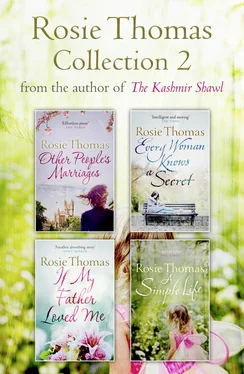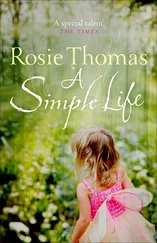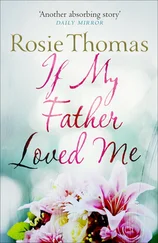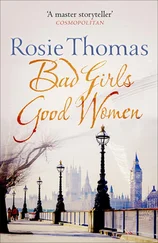There was a basket in the back of the car in which she had packed the kettle, cups and tea for themselves and the removal crew, as an article on moving house in a homemaking magazine had advised her to do. In the days before the move Nina had become a paragon of organization. She had made dozens of lists, adding and crossing off, defining and redefining her intentions. She would not be caught out in the small issues, at least. Every box and carton and piece of furniture was labelled with its eventual destination in the new house, she had measured and checked every dimension twice, she knew the whereabouts of every necessary key and switch and security code.
It was the large issues that were more problematic, like whether she was right to be moving, or whether she was insane to do it, as most of her loving friends certainly suspected.
‘Are you okay?’ Patrick asked.
She smiled sideways at him. ‘Fine.’
The countryside unscrolled alongside them. In an hour, more or less, they would be in Grafton.
The great twin towers of the cathedral were visible first. They stood with the town drawn around them in the quiet and fertile fields enclosed by a rim of little grey hills. It was a perfectly English prospect. The pilgrims who came to Grafton five hundred years before would have had the same view as they wound their way down from the chalk uplands.
The town had grown some ugly outskirts since Nina’s childhood. Coming from the London road they did not go by the new business park set in its landscaped gardens. Instead, on this eastern side, there was a huge red-brick supermarket, an estate of miniature red-brick houses shuffled close together, a pair of petrol stations confronting one another across a stream of cars, and a Little Chef. The road became a maze of roundabouts and traffic lights, and litter whirled up in the wind.
‘Drive straight through,’ Nina said, wanting to apologize for this modern mess. Patrick pointed the car towards the cathedral towers.
Once they had crossed the river by the Old Bridge, they were in the old town where the medieval streets curled in their protective pattern towards the cathedral and the close. It was four o’clock in the afternoon, the traffic was curdled and there were crowds of shoppers on the pavements, mothers with buggies and schoolchildren and pensioners outside Boots, but the sight of the place made Nina happy. The superficial look of it had changed, but the bones of it were the same as they had been when she was growing up, the same as they had been for hundreds of years, and the bones were beautiful.
The pale limestone of the buildings was butter-soft in the late sun. The curves of the streets, Southgate and Coign Street and Drovers, were graceful, and the proportions of the houses and the lines of their roofs were intimate and pleasing. There was a glimpse of a cobbled square through an archway, and the grey front of a Norman church.
‘Where now?’ Patrick asked.
‘That way.’
Nina pointed. There was a narrow entry, just wide enough for the car, where the stone of the old walls was pocked and darkened with the rubbing of countless shoulders.
They passed through the entry and came out into the glory at the heart of Grafton, the cathedral green with the close to one side behind high walls and the great west front of the cathedral itself.
Patrick looked up at the wide tiers of golden stone, the carved companies of faceless saints and archangels in their niches, ranked upwards and rising between the exuberance of columns and piers, to the vast darkened eye of the west window and the height of the Gothic pinnacles towering above.
‘I had forgotten how very grand it is,’ he murmured at last.
Nina was pleased, possessive.
‘I forget, too. Every time it amazes me. There’s my house.’
To one side of the green, forming its northern border, there was a terrace of fine Georgian houses. There were four wide steps with iron railings leading up to each front door, and the balconies to the tall first-floor windows were an intricate tracery of wrought-iron leaves. Nina’s new house was in the middle of the row, looking directly out over the mulberry tree in the centre of the green.
As she climbed out of Patrick’s car, stretching her legs and easing her shoulders after the confinement of the long drive, she stopped for a moment to gaze up at her own blank windows.
‘When I was a little girl I always said that I wanted to live in Dean’s Row. My mother used to laugh. “Why settle for that?” she used to say. “Why not the Bishop’s Palace itself?” The answer was always that I didn’t want to marry the Bishop because he had funny teeth.’
Patrick came to stand beside her.
‘And now here you are.’
She heard the silent rider, Maybe it isn’t such a half-arsed scheme to come and live down here , as clearly as if he had enunciated it.
‘Have you got the keys?’
Nina took the heavy bunch out of her bag and held it up. ‘Yale, Chubb and burglar alarm.’
Patrick waited beside his car and let her go alone up the four steps to unlock the door.
She liked the house empty, like this. She could see and admire the ribs and joints of it. In the drawing room the oak floorboards were two handspans broad, smooth and glowing with age. The window shutters folded into their own recesses in the panelling with seductive precision, and the thin glazing bars divided the glass and the late afternoon light into eighths, sixteenths, tidy fractions. Over her head in the hallway the curving wrought-ironwork of the stair rails sprang up from each stone tread and drew her upwards through the centre of the house. The bedrooms were square, well-proportioned, each with its iron grate and painted overmantel. The house was much too big for her, but that did not matter particularly. Richard had left her wealthy. The memory of that, the surprising figures contained in his will, could still catch her off-balance.
At the top of the house the previous owners had created a studio. The slope of the pitched roof, concealed by a low parapet from the green and the cathedral’s west porch, was a sheet of glass. There were the Gothic pinnacles, seeming to float above Nina’s head in the breadth of the sky.
It was here that she would work. Her plan chests and her drawing board and her desk would be installed, neat and complete, with her boxes of paints and coloured ranks of inks and pencils. Nina was an illustrator of children’s books, her work much admired.
‘Nina?’
Patrick’s voice rose from a long way beneath her.
‘I’m coming.’
He was standing outside the drawing room. The door stood ajar behind him, to admit a view of the mulberry tree and of the saints and archangels in their stone niches.
‘What do you think?’
‘It’s wonderful. A beautiful house.’
She put her arms around him and hugged him. Again she felt the resistance – not rejection, but containment – that told her he didn’t know what to do with her. It wasn’t that she expected anything. Patrick was gay. She had known that for all the ten years they had been friends. But his awkwardness emphasized that her bereavement and the sympathy which followed it had set her apart. She was separate. She was to be treated with care, when in reality her grief and her needs made her long to be pulled in, peremptorily handled, to be loved so roughly that the memories were obliterated. Nina longed for it, bled for it.
‘Shall we go down to the kitchen and have some tea?’
Patrick patted her shoulder. ‘Excellent.’
He had unloaded the boxes from the back of his estate car and stacked them inside the front door.
‘You should have waited for me to help you carry that in.’
‘Nina, darling, if I can’t manhandle a few packing cases, who can?’
Читать дальше












